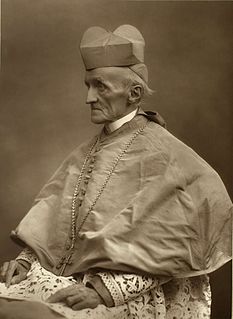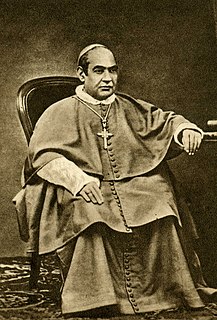A Quote by Gregory of Nazianzus
No one seeing a beautifully elaborated lyre with its harmonious, orderly arrangement, and hearing the lyre's music will fail to form a notion of its craftsman-player, to recur to him in thought though ignorant of him by sight. In this way the creative power, which moves and safeguards its objects, is clear to us, though it be not grasped by the understanding. Anyone who refuses to progress this far in following instinctive proofs must be wanting in judgment. But still, whatever we imagined or figured to ourselves or reason delineated is not the reality of God.
Quote Topics
Anyone
Arrangement
Beautifully
Clear
Craftsman
Creative
Creative Power
Fail
Far
Figured
Following
Form
God
Harmonious
Hearing
Him
His Way
Ignorant
Imagined
Instinctive
Judgment
Moves
Music
Must
Notion
Objects
Orderly
Ourselves
Player
Power
Progress
Reality
Reason
Refuses
Seeing
Sight
Still
Though
Thought
Understanding
Us
Wanting
Way
Whatever
Which
Will
Related Quotes
The scientist who recognizes God knows only the God of Newton. To him the God imagined by Laplace and Comte is wholly inadequate. He feels that God is in nature, that the orderly ways in which nature works are themselves the manifestations of God's will and purpose. Its laws are his orderly way of working.
Far be it from us to doubt that all number is known to Him 'Whose understanding is infinite' (Ps. 147:5). The infinity of number, though there be no numbering of infinite numbers, is yet not incomprehensible by Him Whose understanding is infinite. And thus, if everything which is comprehended is defined or made finite by the comprehension of him who knows it, then all infinity is in some ineffable way made finite to God, for it is comprehensible by His knowledge.
Praise consists in the love of God, in wonder at the goodness of God, in recognition of the gifts of God, in seeing God in all things He gives us, ay, and even in the things that He refuses to us; so as to see our whole life in the light of God; and seeing this, to bless Him, adore Him, and glorify Him.
How easily we make things as way, truth, and life. Or, we call hot atmosphere as life, we label clear thought as life. We consider strong emotion or outward conduct as life. In reality, though, these are not life. We ought to realize that only the Lord is life. Christ is our life. And it is the Lord who lives out this life in us. Let us ask Him to deliver us from the many external and fragmentary affairs that we may touch only Him. May we see the Lord in all things-way, truth, and life are all found in knowing Him. May we really meet the Son of God and let Him live in us. Amen.
Once [a soul] is condemned by God, then God's friends agree in God's judgment and condemnation. For all eternity they will not have a kind thought for this wretch. Rather they will be satisfied to see him in the flames as a victim of God's justice. ("The just shall rejoice when he shall see the revenge . . ." Psalm 57:11) They will abhor him. A mother will look from paradise upon her own condemned son without being moved, as though she had never known him.
We know when we are following our vocation when our soul is set free from preoccupation with itself and is able to seek God and even to find Him, even though it may not appear to find Him. Gratitude and confidence and freedom from ourselves: these are signs that we have found our vocation and are living up to it even though everything else may seem to have gone wrong. They give us peace in any suffering. They teach us to laugh at despair. And we may have to.
We can never put enough distance between ourselves and what we love. To think that God is, is still to think of him as present; this is a thought according to our measure, destined only to console us. It is much more fitting to think that God is not, just as we must love him purely enough that we could be indifferent to the fact that he should not be. It is for this reason that the atheist is closer to God than the believer.
God's love never ceases. Never. Though we spurn him. Ignore him. Reject him. Despise him. Disobey him. He will not change. Our evil cannot diminish his love. Our goodness cannot increase it. Our faith does not earn it any more than our stupidity jeopardizes it. God doesn't love us less if we fail or more if we succeed. God's love never ceases.
You must pray for yourself constantly. How could it be otherwise? We worship God by believing in Him, trusting Him, and loving Him wholeheartedly - and we can attain to that only through prayer. The sole object of our being here is that we may grow like Him - and we can do that only through prayer. The more we pray for ourselves the more power will our prayers have for any other purpose whatever; so praying for ourselves is the reverse of selfishness - it is truly glorifying God.
Thy word remaineth for ever, which word now appeareth unto us in the riddle of the clouds, and through the mirror of the heavens, not as it is: because that even we, though the well beloved of thy Son, yet it hath not yet appeared what we shall be. He looked through the lattice of our flesh and he spake us fair, yea, he set us on fire, and we hasten on his scent. But when he shall appear, then shall we be like him, for we shall see him as he is: as he is, Lord, will our sight be, though the time be not yet.
Does God have a reason for wanting us to be charitable, to take care of those who can't take care of themselves? Either God does or God doesn't, it's just logic. If God has a reason then there is a reason independent of God and whatever God's reason is we should figure it out for ourselves. There is a reason and God doesn't really ground morality at all. God wants us to give charity because it's the right thing to do.









































